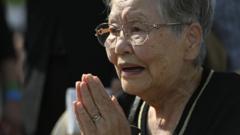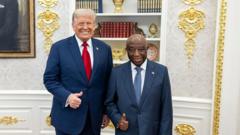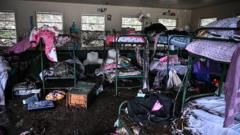The 80th anniversary of Hiroshima's atomic bombing raises important discussions about the legacy of nuclear weapons and contemporary global conflicts.
**Hiroshima Commemorates 80 Years Since Catastrophic Atomic Bombing**

**Hiroshima Commemorates 80 Years Since Catastrophic Atomic Bombing**
Revisiting the past, Japan reflects on the consequences of nuclear warfare and the ongoing advocacy for peace.
On Wednesday, Hiroshima held a somber ceremony to commemorate the 80th anniversary of the atomic bombing by the United States, a pivotal event that ended World War II and left indelible scars on both the city and its survivors. Japanese Prime Minister Shigeru Ishiba, along with global leaders and Hiroshima's Mayor Kazumi Matsui, participated in a silent prayer to honor the more than 200,000 lives lost to the immediate impacts and long-term effects of radiation.
Mayor Matsui expressed grave concerns about the escalating military build-up worldwide, criticizing the prevailing notion that nuclear weapons are vital for national security. He stressed the lessons that should have been learned from historical tragedies and called for a reevaluation of nuclear policies.
Survivor Shingo Naito poignantly recalled his childhood experience, detailing the horrific aftermath of the bomb that claimed his father and siblings. He has dedicated himself to sharing his narrative with younger generations, transforming his painful past into art with students in Hiroshima. In a broader context, 2024 may see the Nobel Peace Prize awarded to Nihon Hidankyo, a group representing atomic bomb survivors, recognizing their efforts to abolish nuclear armament globally.
In his speech, Matsui underscored the precarious state of the nuclear Non-Proliferation Treaty, urging the Japanese government to ratify the Treaty on the Prohibition of Nuclear Weapons, implemented in 2021. While over 70 nations have backed this treaty, key nuclear states—including the United States and Russia—remain opposed, citing the necessity of deterrence amidst current global tensions.
The debate surrounding nuclear arms continues to stir emotions in Japan, illustrated by public protests against their existence. Survivor Satoshi Tanaka echoed this sentiment, drawing parallels between his traumatic experiences and the ongoing violence in regions like Gaza and Ukraine—images that evoke memories of destruction and despair.
Tanaka advocated urgent action to propel nuclear-armed leaders towards disarmament, emphasizing the critical need for global outrage and mobilization against the potential threat of nuclear war.
As Hiroshima stands resilient, its narrative serves as a powerful reminder of the consequences of warfare and the continuous pursuit of peace amidst the shadows of history.
Mayor Matsui expressed grave concerns about the escalating military build-up worldwide, criticizing the prevailing notion that nuclear weapons are vital for national security. He stressed the lessons that should have been learned from historical tragedies and called for a reevaluation of nuclear policies.
Survivor Shingo Naito poignantly recalled his childhood experience, detailing the horrific aftermath of the bomb that claimed his father and siblings. He has dedicated himself to sharing his narrative with younger generations, transforming his painful past into art with students in Hiroshima. In a broader context, 2024 may see the Nobel Peace Prize awarded to Nihon Hidankyo, a group representing atomic bomb survivors, recognizing their efforts to abolish nuclear armament globally.
In his speech, Matsui underscored the precarious state of the nuclear Non-Proliferation Treaty, urging the Japanese government to ratify the Treaty on the Prohibition of Nuclear Weapons, implemented in 2021. While over 70 nations have backed this treaty, key nuclear states—including the United States and Russia—remain opposed, citing the necessity of deterrence amidst current global tensions.
The debate surrounding nuclear arms continues to stir emotions in Japan, illustrated by public protests against their existence. Survivor Satoshi Tanaka echoed this sentiment, drawing parallels between his traumatic experiences and the ongoing violence in regions like Gaza and Ukraine—images that evoke memories of destruction and despair.
Tanaka advocated urgent action to propel nuclear-armed leaders towards disarmament, emphasizing the critical need for global outrage and mobilization against the potential threat of nuclear war.
As Hiroshima stands resilient, its narrative serves as a powerful reminder of the consequences of warfare and the continuous pursuit of peace amidst the shadows of history.






















